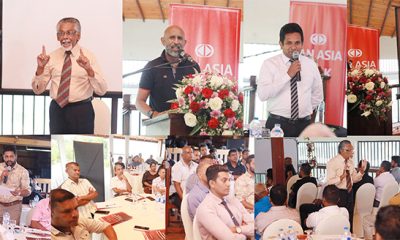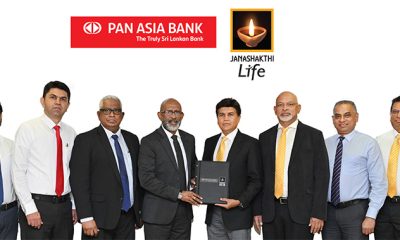Business
Pan Asia Bank’s Internet Banking platform receives overwhelming response
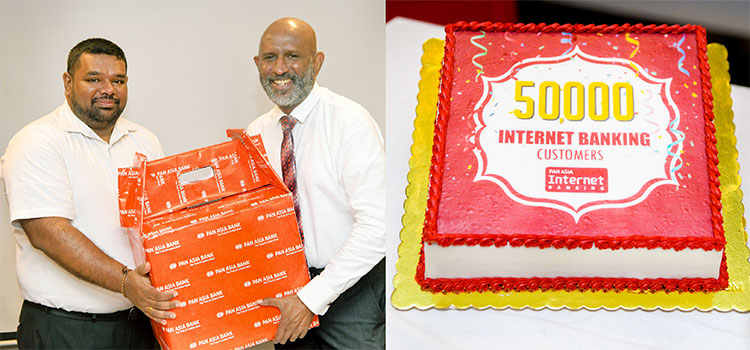
Pan Asia Bank in a simple ceremony recently felicitated its 50,000th Internet Banking customer and has observed increased registrations from outstation areas in the country for its Internet Banking services, a testimony to the Bank’s efforts for financial inclusion.
This also reflects the high level of convenience customers feel in availing of Pan Asia Bank’s Internet Banking platform. Internet Banking is becoming the norm for customers who prefer the convenience of conducting transactions at the time and place of their own choice.
The Internet Banking service offers a convenience and hassle-free mode of conducting transactions for Pan Asia Bank customers. Some of the key benefits include the facility to ttransfer funds in real time from customer accounts to other accounts; secure and convenient access to accounts 24/7 from anywhere; pay all utility bills; and set up standing orders online to pay bills or transfer funds weekly, monthly or yearly. In addition, customers can also settle Pan Asia Bank or other selected local bank credit cards.
Buddhika Perera, Chief Manager – Deposit Mobilization commented, “A major aspect of Pan Asia Bank’s Internet Banking is the high security feature – Multi-level Authorization – which ensures watertight security and privacy. Customers can also perform fund transfers and bill payments whilst passing it through the necessary approval process without having to visit the bank or the merchant. With more and more transactions becoming paperless, Pan Asia Bank is pleased to empower its customer base with this digital service.”
Recording consistent growth year after year, Pan Asia Bank is strongly positioned as the ‘Truly Sri Lankan Bank’, marking an illustrious journey that has promoted financial security and fulfilled the aspirations of its customers while supporting the prosperity of the nation.
Business
Foreign Minister defends India pacts, sidesteps transparency demand
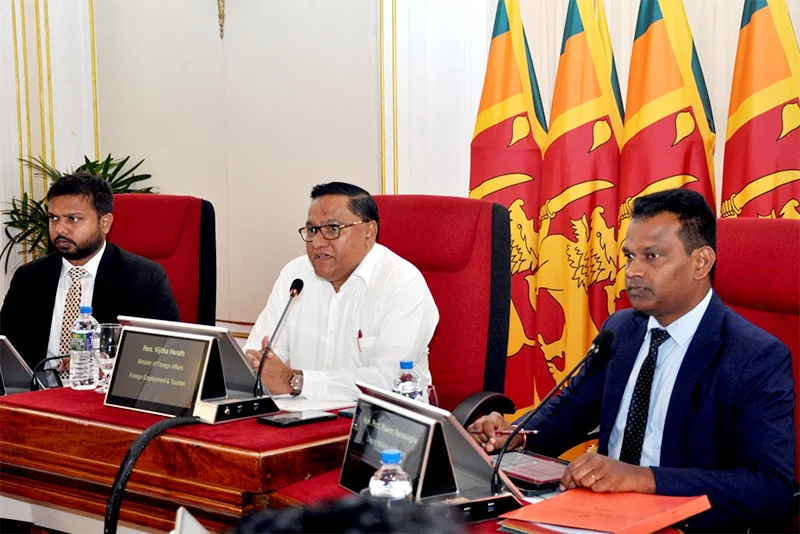
In a press conference marked by both clarity and pointed omission, Foreign Affairs and Tourism Minister Vijitha Herath, yesterday offered a robust defence of two controversial bilateral agreements with India but conspicuously avoided committing to tabling their full texts in Parliament.
The minister’s appearance, billed as a year-opening briefing, took a sharp turn when questioned on the strategic implications of the India-Sri Lanka Defence Cooperation Agreement and Sri Lanka’s acceptance of the Indian Pharmacopoeia.
“No Indian military camps on our soil”
Responding in Sinhala to a question posed in English, Minister Herath moved first to allay what he suggested were widespread misapprehensions about the defence pact.
“This agreement is especially for data and information exchange purposes regarding drug trafficking, drug mafias, human trafficking, and any terrorist activities that could threaten regional security and peace,” Herath stated.
He emphasised that it would also facilitate “various support related to the defence sector.”
In his most definitive assertion, aimed at quieting a persistent national anxiety, the Minister declared: “We must clearly say that there is no plan or possibility of setting up Indian defence camps on Sri Lankan soil.” He categorised the pact not as a “defence agreement” but a “defence cooperation agreement in its real sense,” claiming it creates an “advantageous position” for Sri Lanka.
He linked recent post-‘Ditwah’ cyclone disaster support from India, as well as U.S. aerial support during recovery efforts, to the frameworks established by such cooperation agreements, arguing they have proven beneficial.
Indian Pharmacopoeia: A reputation-based advantage
On the equally contentious acceptance of the Indian Pharmacopoeia – a standard synopsis for drug manufacturing – Minister Herath framed it as a logical step that formalises existing practice.
“We already import a significant share of medicines from India,” he noted. The agreement, he explained, signifies the acceptance of medicines exported by a “reputed Indian pharmaceutical company” approved by its national regulators.
He assured the public that Sri Lanka’s National Medicine Regulatory Authority (NMRA) will continue to remain the monitor. “By entering into this, no disadvantage will happen to us. Only an advantage will happen… it will only be beneficial to us,” he emphasised.
The unanswered question
Despite the detailed assurances, the Minister pointedly ignored the final and arguably most critical part of the question posed by The Island Financial Review : whether the government would table the full text of the two agreements in Parliament for transparent debate and discussion.
This omission is likely to fuel further controversy, as opposition parties, civil society groups, and independent analysts have repeatedly demanded full parliamentary scrutiny, arguing that agreements touching on sovereignty and public health mandate the highest level of public transparency.
Tourism Pride
Shifting to his tourism portfolio, Minister Herath struck an optimistic note, citing record tourist arrivals and foreign remittances in 2025 as a sign of resilient recovery post-Ditwah.
The conference also touched on global affairs. When asked about the U.S. arrest of Venezuelan President Nicolás Maduro, Herath presented a nuanced governmental position. He stated that while his party, the JVP, condemns the action, the government’s official stance is to urge respect for national sovereignty in line with the UN Charter – a reflection of the coalition’s delicate balancing act between ideological roots and diplomatic pragmatism once in governance.
Minister Herath’s explanations provide the government’s clearest public rationale yet for the India agreements, directly confronting fears over militarisation and pharmaceutical quality. However, the deliberate sidestepping of the transparency query left a communication deficit at the heart of the press conference.
High-stakes diplomacy
It reflected a perception that while the administration is willing to defend its policy outcomes, it remains reluctant to subject the processes of high-stakes diplomacy to the full glare of parliamentary and public scrutiny. As these agreements continue to shape Sri Lanka’s strategic and health landscape, the call for their full disclosure is now accompanied by a louder question about the government’s commitment to open governance.
by Sanath Nanayakkare
Business
‘Vehicle-Testing Can Save Lives’
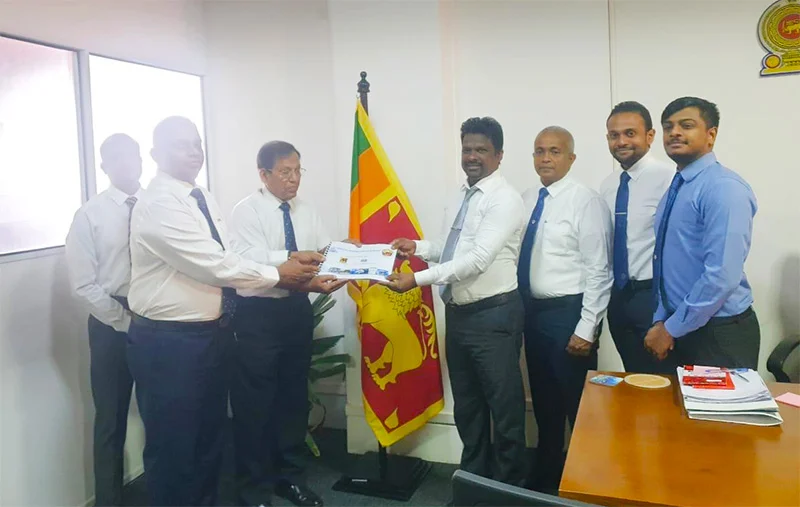
Automobile Association of Ceylon (AAC), in collaboration with the Federation Internationale de L’ Automobile (FIA) and under the UN Decade of Action for Road Safety has been consistently engaging in road safety enhancement programs for all citizens of Sri Lanka.
Current data indicates that while over 08 million vehicles are registered in the country, only heavy vehicles (less than 20% of the vehicle population) are subjected to compulsory road-worthiness tests.
Fatal accidents due to technical failures in vehicles are on the rise and the damage to lives and property is severe.
We also understand that there is a death every three hours and eight deaths per day in road accidents. This amounts to nearly 3000 deaths in road accidents per year.
AA of Ceylon has launched the “Vehicle Testing can Save Lives” project with the advice and support given to execute our campaign by the Minister of Transport, chairman, National Council for Road Safety (NCRC), Deputy Inspector General of Police (Traffic Division), Dr. Indika Jagoda, Deputy Director (Accident Service), National Hospital, president, Lions Club of Boralasgamuwa, Metro(Lions Club International – District 306 D 2) and other stake-holders to find a workable, low / cost solution for mandatory vehicle testing in Sri Lanka.
Therefore, this project aims to educate the public on the necessity of checking essential safety features in all vehicles and the benefits of same to all road users.
AAC has therefore respectfully requested Anura Kumara Dissanayake, President of the Democratic Socialist Republic of Sri Lanka, to consider implementing the proposal we have submitted to him, to minimize fatal accidents, injuries to people and damage to vehicles and property due to road accidents and to also implement a rule to have compulsorily road-worthiness checking of all vehicles. (AAC)
Business
INSEE Lanka appoints new Chief Executive Officer

Siam City Cement (Lanka) Limited (INSEE Lanka) has announced the appointment of Eng. Thusith C. Gunawarnasuriya as its new Chief Executive Officer, effective 01 January 2026. He succeeds Nandana Ekanayake, who will continue to serve as Chairman, ensuring leadership continuity and strategic stability for the organisation.
A long-standing contributor to INSEE’s journey, Thusith has worked with the company through its evolution under Holcim (Lanka) Ltd, LafargeHolcim and INSEE, playing pivotal roles that influenced both operational progress and strategic direction.
Rejoining INSEE Lanka in January 2025 as Chief Operating Officer, he has since demonstrated exceptional leadership, driving topline growth, improving EBITDA performance, and strengthening talent development initiatives that enhanced organisational capability and business outcomes.
His expertise in business strategy, operations excellence, and supply chain transformation is well-recognised, supported by over 25 years of multi-industry and multi-country leadership experience. His career includes senior positions at Lion Brewery (Ceylon) PLC, Hemas Manufacturing, Fonterra Brands Lanka, GlaxoSmithKline, MAS Active, and DMS Software Engineering. His international exposure spans India, Bangladesh, and Thailand.
Thusith is a proud alumnus of Dharmaraja College, Kandy, and holds a BSc (Hons) in Electrical & Electronic Engineering from the University of Peradeniya, an MBA from the University of Colombo, and an MSc in Business & Organizational Psychology from Coventry University, UK. He has completed executive leadership programs at IMD (Switzerland) and the National University of Singapore. He is also a member of IEEE (US), CILT (UK), ISMM (Sri Lanka), and IESL (Sri Lanka).
Chairman’s Quote – Nandana Ekanayake:
“Thusith’s deep understanding of our business, strong operational mindset, and proven leadership make him the ideal successor to lead INSEE Lanka into the next phase of growth. His experience within INSEE and across multiple industries, positions him well to deliver on our long-term ambitions and uphold the values that define the organisation.”
-

 News11 hours ago
News11 hours agoBroad support emerges for Faiszer’s sweeping proposals on long- delayed divorce and personal law reforms
-

 News1 day ago
News1 day agoPrivate airline crew member nabbed with contraband gold
-

 News3 days ago
News3 days agoHealth Minister sends letter of demand for one billion rupees in damages
-

 Opinion5 days ago
Opinion5 days agoRemembering Douglas Devananda on New Year’s Day 2026
-

 News6 days ago
News6 days agoLeading the Nation’s Connectivity Recovery Amid Unprecedented Challenges
-

 Features1 day ago
Features1 day agoPharmaceuticals, deaths, and work ethics
-

 Latest News1 day ago
Latest News1 day agoCurran, bowlers lead Desert Vipers to maiden ILT20 title
-

 News1 day ago
News1 day agoPM lays foundation stone for seven-storey Sadaham Mandiraya


